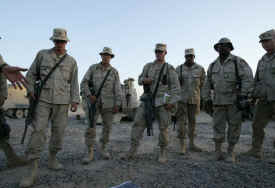 |
July 22, 2004
By Capt. Zachary Miller, 20th Engineer Battalion
BAGHDAD, Iraq - Block-by-block Soldiers of the 1st Cavalry Division's 20th Engineer Battalion are taking aim at one of the most disagreeable problems facing Baghdad's largest and most dangerous neighborhood. Sadr City, home to more than 2.5 million people, has been awash in standing sewage for years - the result of a system designed 25 years ago for a population one fifth of what it must now support.
The heart of the system is a network of 15 lift stations that remove sewage from the streets and residences. Years of neglect have left them in failing condition, operating at perhaps 30 percent of their original capacity. It is these stations that were the first target in the war for sewage-free streets in Sadr City.
The project, overseen by Company C, 20th Engineer Battalion, aimed to completely rehabilitate two of these stations. At a cost of just over $235,000, Iraqi contractors who were selected in conjunction with the city of Baghdad's public works, completed the repairs in a little over two months.
"We were able to repair or replace all the electrical controls, pumps, and mechanical systems that make these stations run" said 1st Lt. Gary McDonald, a Company C platoon leader and one of the project managers.
Additionally, the projects upgraded the existing force protection measures at the stations. Barriers that were once falling apart were replaced with nine-foot high walls and reinforced gates. Both the city and the project developers are hopeful that the improved protection will keep criminals and looters away from the station and ensure they continue to operate at full capacity.
Perhaps the most noticeable construction is a new residence for the operators, who not only work, but also live at the pump station.
"What struck me the most was that the family who ran the station lived in a house built out of scrap metal," said Staff Sgt. Darron Adams, a squad leader in charge of one of the engineer teams on the project. "I can't imagine that they were too motivated to do their job when they were living in such poor conditions."
After removal of the family's dilapidated home, a three-room house was built in its place, providing significantly better accommodations for a family of five.
Though the Soldiers can look proudly on the finished facilities, they know that completing them was no trivial matter. The two lift stations are in one of the worst parts of Sadr City. On three separate occasions, the team assigned to check up on progress and ensure that work was being completed properly came under attack from enemy forces.
During the most intense of these engagements, one Soldier suffered minor wounds from a grenade, becoming perhaps the first soldier awarded a Purple Heart while attempting to repair a sewage lift station.
"This can be a dangerous place, but getting the local population working on improving their own city is definitely going to help tip the scales in our favor," said 1st Lt. Seth Pruett, another platoon leader who helped in the effort. "As we get more projects going and things keep getting noticeably better, I know we will win over more Iraqis."
With their first project behind them, the engineers have quickly turned their attention to the next challenge. Currently, two more stations are undergoing similar repairs and the unit, in conjunction with the Iraqi Ministry of Electricity, is preparing to provide dedicated power lines to eight sewage lift stations in Sadr City. By installing underground power lines that directly service the lift stations, the city will be able to continue pumping sewage even if the power goes off in other areas.